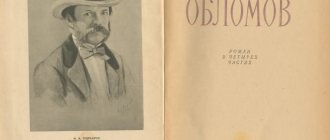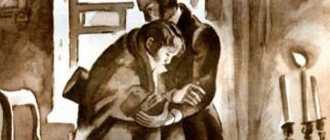Appearance
Ilya Ilyich Oblomov is a man of 32–33 years old . He has a pleasant appearance and is of average height. His face is always calm, his expression shows a soft character, a lack of concentration. Good nature shone in Oblomov’s dark gray eyes, in his smile and movements.
He was pampered, flabby beyond his years, his complexion was not entirely fresh - all this was a consequence of the lack of exercise and fresh air.
Even when Ilya Ilyich was alarmed, his movements were smooth and lazy.
He liked his clothes and shoes not to constrain him, so at home he wore a wide oriental robe and soft, wide shoes.
Life of a hero
The hero's life in the novel is given a lot of attention. His lifestyle is an exact continuation of his external description. It seems that Oblomov’s room is almost perfectly decorated, thought out to the smallest detail, but upon careful reading of its description, it becomes obvious that sloppiness is a common thing for the character. There are cobwebs around the perimeter of the bedroom, dirt and crumbs everywhere. It seems as if there have been no residents here for a long time. Such a description is an allegory of the image of Oblomov: he really, for the most part, lives not here, but in an illusory world invented by him.
Origin, upbringing, education
Oblomov is a nobleman, the owner of an estate and three hundred serfs. His parents were good-natured people. They led a serene life on their estate, not wanting to engage in any activity. The father and mother instilled in the son that doing nothing is natural for a master, that bothering oneself with anything, working, is not a master’s business.
Oblomov studied until he was 15 years old at the boarding school of Stolz, the manager of the estate in Verkhlev, and was friends with his son, Andrei, his same age.
The parents tried to prevent their son from becoming exhausted with his studies; they often left him at home under any pretext.
Then they sent their son to Moscow to continue his education, since they knew that without education they would not be able to get ranks and money. Oblomov studied and read books not very willingly.
Having completed his studies, he could not put his knowledge into practice: he could not write a statement if necessary, he did not settle accounts on the estate himself, but entrusted the elder with this task.
Life in a horizontal position
Ilya thinks about the misfortunes that have befallen him. This is how the man describes the troubles associated with the affairs of the estate inherited from his parents and the search for a new apartment.
Attention! You do not have permission to view hidden text.
He gives orders to the old lackey Zakhar in bed. The master receives guests who often visit him lying down, in an old darned robe.
Oblomov’s former colleagues also come. And he does not at all strive to show his best side, meeting them cheerful and in excellent health. He always complains to young, handsome men about their health.
Attitude to life, society
Having been released from service, Oblomov began to visit his friends and attend society, but soon he was tired of the crowds and bustle. His life became monotonous, but he did not want to return to society, because he saw there the dominance of gossip, greed, envy, commitment to card games, and a lack of interests of the mind and heart.
He set himself the goal of making improvements in the management of the estate, first drawing up a plan for these improvements, and then living in the village, like his ancestors, a carefree life with his family. He described the pictures of such a life to his friend Andrei Stolts in such a way that he said: “Yes, you are a poet, Ilya!”
But, unfortunately, Oblomov turned out to be unsuitable for realizing his ideal of life. The reason for this was laziness, which his parents taught him to do.
Clutter in the apartment and in the shower
Rarely leaves the house. He rejects invitations from acquaintances to attend social events. He justifies the refusal with poor health, barley, drafts and dampness, which is contraindicated for him.
“When I was at home, I almost always lay down, and everyone was in the same room.”
His best friend Andrei Ivanovich Stolts compares Oblomov to an animal that is constantly in a dark lair.
“Have you really prepared yourself for such a life, so that you can sleep like a mole in a hole?”
Zakhar reports to Andrei that he has polished his owner’s shoes a long time ago, and the boots stand untouched.
He wakes up late. He eats and drinks tea in bed. A footman helps him put on his socks. House shoes are placed near the bed so that when you put your feet down it is easy to slip into them. Oblomov is very lazy. Never cleans up after himself. In his room there are mountains of dirty dishes, which are difficult for a man to take to the kitchen. Since childhood, it was customary in his family to sleep during the day. Ilya still adheres to a similar routine.
“After lunch, nothing could disturb Oblomov’s sleep. He usually lay down on the sofa on his back.”
Love for a woman
Arriving in St. Petersburg, Oblomov sometimes fell in love with women, but the crush did not last long and did not turn into love. He avoided getting close to women because he didn't want the hassle. But one day Ilya Ilyich imagined that he loved Mina and paid her more than half of his income. But he soon realized that he was destroying the strength of his soul with her.
Ilya Ilyich’s soul was resurrected by his love for the beautiful girl Olga Ilyinskaya. He developed a desire to live life to the fullest, rather than exist. But when Olga agreed to marry him, he began to have thoughts about many responsibilities, that before marriage he needed to put his property affairs in order.
The first steps in this direction were so difficult for Ilya Ilyich that his love began to cool. Olga realized that she could not attract him to an active life. She could not live like Oblomov, and broke up with him. Ilya Ilyich worried for a long time, but he understood that he was unworthy of Olga.
Oblomov rented an apartment from the widow Agafya Matveevna Pshenitsyna, a kind, simple, very hardworking woman. She loved her tenant with all her heart and took care of him. Agafya Matveevna evoked a reciprocal feeling in Oblomov. He married her and found the happiness of peace.
SPADILO.RU
Oblomov. Actor O. Tabakov. Film “A few days in the life of I.I. Oblomov." 1979
Ilya Ilyich Oblomov is the central character of the novel of the same name by I.A. Goncharova. The hero lives in St. Petersburg, where he moved from his family estate. Ilya Ilyich is a man who has long been deprived of any aspirations and hopes, who voluntarily confined himself within the four walls of a rented apartment. The emergence of the social phenomenon “Oblomovism” in Russia is largely due to the hero of this work, who is a symbol of stagnation, apathy and complete inactivity.
Description of the hero
Appearance
Ilya Ilyich was in his fourth decade - at the time of the events he was 32 years old. He is a man of average height, handsome, with a calm and soft expression on his face. Dark gray eyes express goodwill, but there is absolutely no concentration in them. Sometimes a fleeting thought “hid itself in the folds of the forehead, then completely disappeared, and then an even light of carelessness glowed throughout the face.” Carelessness and some kind of warm-heartedness shine through in the entire appearance of the hero. The flabbyness that his body acquired too early and the unhealthy complexion indicate that the hero rarely spends time outdoors and moves too little. Oblomov’s favorite place to live is an old sofa, his usual clothes are an enormous oriental robe and soft shoes. This home wardrobe is in perfect harmony with the entire appearance of its owner.
Character
Illustration for the novel “Oblomov”. Artist K. Tikhomirov
Apathy and laziness are Oblomov’s pronounced negative traits. This type of character was formed in him as a child, in the atmosphere of the sleepy kingdom in which the inhabitants of Oblomovka lived. No one instilled in him even a small portion of those necessary skills that are useful to a person entering adulthood. Not he himself, but others were always the fulfillers of his desires, but his parents did not see anything reprehensible in this. After all, the boy is a gentleman, even if he is a small one, and it is not appropriate for barchuks to overwork themselves according to their class. This upbringing resulted in the fact that the adult Oblomov still continues to hope that someone will come and solve all his problems for him. Even a letter from the manager of Oblomovka is unable to get him off the couch to figure out what is happening on the estate.
But there are also positive sides to Ilya Ilyich’s character. First of all, it is kindness and responsiveness, the ability to sympathize. Oblomov is also endowed with such a property as insight. After all, thanks to her, he was the first to understand that a relationship with Olga was a road to nowhere. Dreaminess, romanticism, and the ability to subtly feel and experience are not alien to the hero. Unfortunately, his fate was such that these fantasies and dreams were not destined to come true. Meanwhile, he feels good in his dreams, because there he does not need to adapt to the cruel world around him, which he does not accept with his whole being.
The apartment where the hero lives looks uncomfortable and neglected. Zakhar does the cleaning, and then, rather, for appearances. If you look closely, you can see cobwebs hanging in the corners, carpets covered in stains, trash under cabinets, dishes not put away. There is a feeling of uninhabitedness and emptiness everywhere. If it weren’t for the sofa with Oblomov, one would think that no one had lived here for a long time.
Biographical elements
Currently, Oblomov owns a family estate with three hundred peasants. This is an inheritance he inherited from his father. It is worth briefly mentioning Oblomov’s parents - good-natured people, adherents of the patriarchal way of life. Their life passed in complete serenity and peace. Father “sat at the window all morning and strictly watched everything that was happening in the yard,” Ilyusha’s mother spent the whole day giving various orders regarding household matters. Her love for her only son knew no bounds. Every morning she showered “him with passionate kisses”, then peered into him “with greedy, caring eyes, whether his eyes were cloudy... if anything hurt.”
From childhood, Ilya Ilyich learned that life is a “quiet river” that flows by, and the ideal of life is idleness and inaction. While still just a child, he built a program for his future life, the model for which was life in Oblomovka. One of the main concerns of the inhabitants of the estate was concern for food: “What calves grew fat there for the annual holidays! What a bird was raised!.. What stocks of jams, pickles, and cookies were there! What honeys, what kvass were brewed, what pies were baked in Oblomovka!”
No one dared to break the age-old tradition - an afternoon nap, which was “the true likeness of death.” Everyone was asleep - the owners, servants, courtyard girls, groom, gardener and other numerous servants. The boy was looking forward to the moment when there was dead silence in the house. At this time, he became left to his own devices and felt like the only one in the whole world. Despite his inquisitive mind, the child, due to his age, did not offer any resistance to the atmosphere of stagnation that reigned in the estate. On long winter evenings, putting Ilyusha to bed, the nanny told him “about some unknown side, where there are neither nights nor cold, where miracles happen, where rivers of honey and milk flow, where no one does anything all year round, and day- Everyday they only know that all the good fellows are walking, such as Ilya Ilyich, and beauties, no matter what you can say in a fairy tale or describe with a pen.” Even in adulthood, Oblomov will continue to believe in miracles, involuntarily regretting why “a fairy tale is not life, and life is not a fairy tale.” He “will forever have the disposition to lie on the stove, walk around in a ready-made, unearned dress and eat at the expense of the good sorceress.”
Studying at a boarding school, moving to St. Petersburg
The time has come to study and “father and mother put the spoiled one Ilyusha in front of a book.” He had to study at a boarding school, which was organized by Ivan Bogdanich Stolz for noble children. His son Andrei became Ilyusha's classmate. Young Oblomov had no desire to learn at all, and his parents saw the only benefit in his education: “they dreamed of an embroidered uniform for him, they imagined him as a councilor in the chamber, and his mother even as a governor.” But they wanted their boy to achieve all this without bothering too much, “somehow cheaper, with different tricks.” In the boarding school, where Oblomov stayed until he was fifteen years old, he, just like at home, was cherished, “like an exotic flower in a greenhouse, and just like the last one under glass, he grew slowly and sluggishly.”
Then he studied in Moscow, after which Oblomov never used the sciences he studied in his life. He justified it this way: “Political economy, for example, algebra, geometry - what am I going to do with them in Oblomovka?” However, vanity and dreams of a brilliant career prompted him to move to St. Petersburg. He took his faithful servant Zakhar with him and lived with him in two rooms, but after he became the owner of Oblomovka, he was able to afford “a larger apartment, added a cook to his staff and got a couple of horses.”
Service, career and guests of Oblomov
Ilya Oblomov. Actor O. Tabakov. Film “A few days in the life of I.I. Oblomov." 1979
In St. Petersburg, Oblomov got a job in the office. He performed minor work corresponding to his position as a collegiate secretary. One day he mixed up the addresses and sent a service letter not to Astrakhan, but to Arkhangelsk. This circumstance frightened Oblomov so much that, out of fear of his superiors, he was forced to resign. This was the end of his never-begun career. Having become free, he initially attended social events, but having become disillusioned with a society riddled with lies, envy and gossip, he began to do this less and less. Then he set himself the goal of bringing order to Oblomovka, getting married and living a carefree life there, like his parents. But the laziness that he absorbed with his mother’s milk did not allow him to carry out his plans.
Oblomov has several friends who visit him regularly. Sudbinsky, Volkov and Penkin drop in rarely and for just a few minutes. People like Alekseev and Tarantiev pay thorough visits. At Oblomov’s they eat, drink, smoke expensive cigars, in a word, they find in his house “a warm, peaceful shelter and always the same, if not warm, but indifferent welcome.” And Ilya Ilyich himself was already accustomed to these people. Alekseev allows him “to live in his own way, that is, lie silently, doze or walk around the room...”. He endures “equally his silence, his conversation, his excitement, and his way of thinking, whatever it may be.” A completely different Tarantiev. He brings “life, movement, and sometimes news from the outside” into Oblomov’s sleepy kingdom. In addition, Oblomov naively hopes that Tarantiev “is really able to advise him something worthwhile.”
Oblomov's dreams
Lying on the sofa, Oblomov “loved to withdraw into himself and live in the world he created.” His head was visited by lofty ideas, in his imagination he felt like a hero - the winner of universal evil. Sometimes he imagined himself as an artist or a great, invincible commander. But when in his dreams he encountered some problem, he began to “pray fervently, earnestly, begging the sky to somehow ward off the threatening storm.” After this, he again became indifferent and indifferent to everything. Even the letter from the manager from Oblomovka and the owner’s demand to vacate the apartment were relegated somewhere far away, to the back burner.
Oblomov was able to realize the whole tragedy of his situation and the fact that “there is buried in him, as in a grave, some good, bright beginning, perhaps now dead, or it lies like gold in the depths of a mountain, and it would be high time for this to happen.” gold to be a walking coin."
Oblomov and Stolz
The friendship between Oblomov and Stolz dates back to early childhood. Then they studied together at a boarding school, and to this day Stolz remains the only person close to Oblomov. In their youth, they were both romantics and dreamers, they were going to “travel the length and breadth of Europe, walk through Switzerland, burn their feet on Vesuvius, go down to Herculaneus.” Only in front of Stoltz can Ilya Ilyich be completely frank and sincere; he discusses his health with him, asks him for advice: “Give me your will and mind and lead me where you want. Maybe I’ll follow you, but I won’t budge alone.”
Stolz is an active and active young man. For him, traveling is a common thing, unlike Oblomov, who “was so spoiled” that he was unable to move out of his apartment. Is it worth talking about long journeys, when Oblomov’s only trip was the road from the estate to Moscow. And she walked with a bunch of servants, “among feather beds, caskets, suitcases, hams, rolls, all sorts of fried and boiled cattle and poultry.”
However, Stolz still manages to interrupt his friend’s seclusion. He intends to bring him back into society. After much persistence, Oblomov agrees, and this can be considered a real feat, the first step towards a “cure.” But during his endless visits, Oblomov begins to notice that representatives of the world are “sleeping people.” “Don’t they sleep sitting all their lives? Why am I more guilty than them, lying at home and not infecting my head with threes and jacks? Oblomov is trying to prove to his friend that social life is the center of lies and hypocrisy, which in no way corresponds to his idea of happiness. He again dreams of life in Oblomovka with his family, in a house with elegant furniture, a piano, and books. This is the very paradise that his imagination depicts.
Before leaving abroad, Stolz makes Oblomov promise that he will come to him in Paris. The strength returning to the hero triumphs over laziness, and he begins to prepare for the journey. He orders travel clothes for himself, buys a suitcase and receives a foreign passport. But he never goes anywhere due to the fact that just before the trip, “his lip got swollen at night.” The comicality of this justification demonstrates better than any words the impossibility for Oblomov to live the life that his friend Stolz leads.
Oblomov and Olga Ilyinskaya
Oblomov and Olga Ilyinskaya. Film “A few days in the life of I.I. Oblomov." 1979
Having settled in St. Petersburg, Oblomov sometimes started relationships with women, but this was only a fleeting crush that never turned into true love. Then he deliberately stopped communicating with the weaker sex in order to avoid various hassles. Oblomov’s soul was stirred by his meeting with Olga Ilyinskaya, with whom he fell in love at first sight. The girl again gave him the desire to live and love. Under the influence of this meeting, Ilya Ilyich began to change, he stopped sleeping after lunch, began reading books, and taking long walks with Olga. Everything began to change after he proposed to the girl and received her consent to become his wife. He was suddenly overwhelmed by thoughts about the upcoming troubles that inevitably accompany preparations for the wedding. The very first attempts to restore order in his affairs turned out to be so overwhelming for Oblomov that his feeling began to fade away. Olga, who so actively took up the task of re-educating Oblomov, realized that her efforts were in vain. Considering it impossible for herself to live like Oblomov, she decided to break up with him.
Oblomov had a hard time being separated from Olga. He was ill for a long time and “little by little he returned to his previous normal life.” However, he was heartily happy for her when he received the news that she had married Stolz. “God himself blessed you! My God! how happy I am!..”
Oblomov and Pshenitsyna
Agafya Matveevna Pshenitsyna was Tarantiev’s godfather, who advised Oblomov to rent an apartment from her on the Vyborg side. He immediately fell in love with this simple and hardworking woman, the widow of an official who at one time held the same post as Oblomov. In turn, Pshenitsyna also treated Ilya Ilyich very well, helped and took care of him. Oblomov realized that Agafya Matveevna’s house was the very piece of paradise that he had dreamed of all his life. Here everything was the same as in beloved Oblomovka, the same conversations about food and provisions, the same peacefully flowing, monotonous days in which there is no place for storms and upheavals.
Here Oblomov became a father for the first time - he had a son, named Andrei in honor of Stolz. Analyzing his life, Ilya Ilyich decided that “he has nowhere else to go, nothing to look for... the ideal of his life has come true.” Oblomov lived quietly and calmly, just as calmly and quietly he passed away, “without pain, without torment, as if a watch had stopped and they had forgotten to wind it.”
The role of the hero in the work
Oblomov is a shining example of a patriarchal nobleman. In the novel, he plays the role of a “superfluous person” who does not accept modern society and is forever stuck in the past. The environment to which his best friend Andrei Stolts and his beloved Olga Ilyinskaya belong is absolutely alien to him. The writer shows “Oblomovism” with its attraction to the distant past, inactivity, indifference and spiritual degradation, when a person turns into biomass lying on the sofa.
At the same time, Goncharov ambiguously portrays representatives of the modern world. Almost each of them is deprived of that peace of mind and inner dreaminess that Oblomov had. Even Stolz finds this peace only in Oblomov’s house. By creating the image of the main character, the author seeks to convey the idea that, despite positive character traits, such as kindness and responsiveness, constant work on developing one’s own personality is necessary. Otherwise, a person will face the same dead-end stagnation into which Oblomov voluntarily drove himself.
Character development as the story progresses
The first acquaintance with the hero occurs when Ilyusha Oblomov is only seven years old; the last chapters describe events that occurred thirty-seven years later. To better understand what changes the main character undergoes throughout the narrative, it is necessary to pay attention to “Oblomov’s Dream”, in which he returns to childhood, to the village where his beloved mother is still alive, where everyone - both masters and servants - is in the kingdom sleep and peace, where “the norm of life was ready and taught to them by their parents, and they accepted it, also ready, from their grandfather, and grandfather from their great-grandfather, with a covenant to preserve its value and inviolability.”
Step by step Oblomov is approaching his degradation. First comes dismissal from service, then loss of interest in society and the outside world as a whole. The hero is left with only a sofa, an enormous robe and slippers. He steadily sinks into complete spiritual apathy and laziness. Even Stolz, full of energy, is not able to awaken in him the desire to start living, and not to continue a meaningless existence. In response, he hears: “I know everything, I understand everything, but there is no willpower.” Oblomov’s love for Olga Ilyinskaya also failed to revive. He is afraid of those qualities unattainable for him that will make him worthy of the love of this girl. He finds his ideal in the house of Agafya Pshenitsyna, who, unlike Olga, does not demand any changes from Oblomov, and loves him as he is.
The author's attitude towards the hero
The author's position in relation to Oblomov is ambiguous. Describing in detail the life of the main character, his way of thinking, Goncharov has a rather positive attitude towards Mr. Oblomov. He even sympathizes with him in his helplessness and inadequacy. He understands that Oblomov is a victim of parental upbringing, and his infantility is a product of the lordly environment, where landowners lead an idle life at the expense of the labor of serfs.
Goncharov shows Oblomov’s positive character traits, such as kindness, decency, intelligence, honesty, so that the reader feels that in front of him, first of all, is a person. At the same time, at times one can feel the author’s antipathy towards the hero for his laziness, incompetence and cowardice. In the finale, Goncharov does not indicate his position in relation to any hero. It remains unknown whose side he takes - the energetic Stolz or the passive Oblomov. Nevertheless, it becomes clear that it was precisely the long-outdated “Oblomovism” that became the cause of the hero’s degradation.
Prototypes
The history of the work is rooted in the life history of I.A. himself. Goncharova. As the writer himself admitted, it was especially important for him to describe complete reality, without straying into the “soil of a thinker.” Thus, we can conclude that the author based his main character on himself. The writer’s contemporaries also spoke about this, finding many coincidences in Goncharov and Oblomov. Both of them came from the Russian patriarchal hinterland, both were distinguished by slowness and, to some extent, laziness, but at the same time, both were smart and decent.
Film adaptations of the hero
Ilya Ilyich Oblomov. Actor O. Basilashvili. T/SP "Oblomov". 1965
In 1965, director and screenwriter, People's Artist of the Russian Federation Alexander Belinsky staged the television play "Oblomov", which became the first film adaptation of the famous novel by I.A. Goncharova. To embody the image of Oblomov, he invited the famous actor Oleg Basilashvili to his work.
In April 1980, the premiere of the two-part feature film “A few days in the life of I.I. Oblomov." The work of director Nikita Mikhalkov is still recognized as the best screen version of the novel. Mikhalkov invited everyone's favorite actor Oleg Tabakov to play the role of Oblomov. Oblomov Tabakov turned out to be very natural and touching. Good-natured, soft, lazy, dreamy - this is how the viewer sees Oblomov performed by Oleg Pavlovich. Although Tabakov himself repeatedly repeated that in reality he was Stolz rather than Bogatyrev. Despite this, the role of Oblomov is one of the best in Oleg Pavlovich Tabakov’s collection.
Literature
- Musatov E.I. From the creative history of the novel by I.A. Goncharov “Oblomov” // Izv. Academy of Sciences of the USSR. Ser. lit. and language T. 24. Issue. 4. - 1965.
- Gorelov A.E. Oblomovshchina: I.A. Goncharov // Gorelov A.E. Essays on Russian writers. - L., 1968. - P. 253-314.
- Frolov V. Oblomov and Oblomovism // Moscow. Truth. — 1969.
- Krasnoshchekova E.A. "Oblomov" I.A. Goncharova. - M.: Artist. lit., 1970.
- Taboriskaya E.M. The author and hero in the novel by I.A. Goncharov “Oblomov” // Izv. Voronezh. ped. in-ta. — Voronezh, 1972.
- Odintsov V.V. Artistic image and style: About the novel by I.A. Goncharov “Oblomov” // Rus. speech. — 1973.
Evaluation of Oblomov’s image by literary critics
The image of Oblomov was not ignored by leading literary critics.
N.A. Dobrolyubov believed that this is “our indigenous, folk type,” which over time changed its forms and acquired a new meaning. The critic believed that Oblomov’s main character trait was complete inertia, which arose from indifference to what was happening in the world.
D.I. Pisarev argued that one cannot sympathize with such individuals, since they “burden both themselves and society.” But you cannot despise them - after all, they themselves suffer from their shortcomings.
Character
Oblomov had both positive and negative character traits. He was distinguished by such qualities as purity and clarity of soul, conscientiousness, kindness, the ability to empathize, modesty, poetry, dreaminess, and loyalty to friendship.
Negative qualities of Oblomov’s personality include: a tendency to laziness, lack of will, excessive timidity and gullibility, laziness of mind and indifference to what is happening in the world.
Ilya Oblomov is a lazy, apathetic person, spends most of his time in dreams, and his imagination is so developed that most fantasies seem quite real to him: he can even cry from the feelings overwhelming him.
Do you know the answer?
Items
New questions
Site rating
- 1. Maryam Dibirgadzhieva 332
- 2. Igor Proskurenko 316
- 3. Tanya Khmelevskaya 228
- 4. Olga Zharkova 213
- 5. Nadezhda Lopina 204
- 6. Anton Voevod 180
- 7. Elzhan Jalshora 166
- 8. Dmitry Gagarin 138
- 9. Amir Abdulaev 128
- 10. Andrey Shkurnov 103
- 1. Yulia Bronnikova 16,560
- 2. Kristina Volosocheva 16,445
- 3. Alina Saibel 16,229
- 4. Ekaterina 16,171
- 5. Maria Nikolaevna 15,755
- 6. Larisa Samodurova 15,695
- 7. Darth Vader 15,311
- 8. Liza 14,940
- 9. TorkMen 14,651
- 10. Vlad Lubenkov 13,435
The most active participants of the week:
- 1. Victoria Neumann - bookstore gift card for 500 rubles.
- 2. Bulat Sadykov - bookstore gift card for 500 rubles.
- 3. Daria Volkova - bookstore gift card for 500 rubles.
Three lucky people who passed at least 1 test:
- 1. Natalya Starostina - bookstore gift card for 500 rubles.
- 2. Nikolay Z - bookstore gift card for 500 rubles.
- 3. David Melnikov - bookstore gift card for 500 rubles.
The cards are electronic (code), they will be sent in the coming days via VKontakte message or email.
Relationships with others
Ilya Ilyich seems quiet, absolutely non-conflicting.
“An observant person, glancing briefly at Oblomov, would say: “Good guy, simplicity!”
His communication with his servant Zakhar from the very first chapters can radically change his opinion. He often raises his voice. Lackey really deserves a little shake-up. The master pays him for maintaining order in the apartment. He often puts off cleaning. Finds hundreds of reasons why cleaning is impossible today. There are already bedbugs, cockroaches in the house, and occasionally a mouse runs through. It is for all sorts of violations that the master scolds him.
Guests come to the apartment: Oblomov’s former colleague Sudbinsky, writer Penkin, fellow countryman Tarantiev. Each of those present tells Ilya Ilyich, who is lying in bed, about his eventful life, and is invited to take a walk and unwind. However, he refuses everyone, leaving the house is a burden for him. The master is afraid that it will leak through him. In every sentence he sees a problem and expects a catch.
“Although Oblomov is affectionate with many, he sincerely loves one, trusts him alone, maybe because he grew up and lived with him. This is Andrei Ivanovich Stolts.”
It will become clear that despite his indifference to all kinds of entertainment, Oblomov does not dislike people. They still want to cheer him up and make another attempt to pull him out of his beloved bed.
Living with the widow Pshenitsyna, Ilya takes great pleasure in working with her children, teaching them to read and write. With the aunt of his beloved Olga Ilyinskaya, he easily finds common topics for conversation. All this proves Oblomov’s simplicity, the lack of arrogance, which is inherent in many landowners.
Service
After training, time passed faster.
Oblomov “never made any progress in any field, he continued to stand at the threshold of his own arena.”
Something had to be done, and he decided to go to St. Petersburg to establish himself in the service as a clerical clerk.
At 20, he was quite naive; certain views on life could be attributed to inexperience. The young man was sure that
“The officials formed a friendly, close family, concerned about mutual peace and pleasure.”
He also believed that there was no need to attend services every day.
“Slush, heat or simply a lack of desire can always serve as a legitimate excuse for not going to work. Ilya Ilyich was upset when he saw that he had to be at work strictly adhering to the schedule. I suffered from melancholy, despite the condescending boss.”
After working for two years, I made a serious mistake. When sending an important document, I confused Astrakhan with Arkhangelsk. I didn’t wait for a reprimand. I wrote a report about leaving, but before that I stayed at home, hiding behind my failing health.
After the circumstances that occurred, he made no attempts to return to service. He was glad that he didn’t need it now:
“from nine to three, or from eight to nine, write reports.”
Now he is absolutely sure that work cannot make a person happy.
History of creation
"Oblomov" is a landmark work for Russian literature of the 19th century. Its meaning is not always accessible to schoolchildren who become acquainted with the book at a young age. Adults consider more deeply the idea that the author wanted to convey.
Ivan Goncharov
The main character of the work is the landowner Ilya Oblomov, whose lifestyle is incomprehensible to others. Some consider him a philosopher, others a thinker, and others a lazy person. The author allows the reader to form his own opinion without speaking categorically about the character.
It is impossible to evaluate the concept of a novel separately from the history of the creation of the work. The basis of the book was the story “Dashing Illness,” written by Goncharov several years earlier. Inspiration struck the writer at a time when the social and political situation in Russia was tense.
The story “Dashing Illness” and the novel “Oblomov”
At that time, the image of an apathetic tradesman who was unable to take responsibility for his actions and decisions was typical for the country. The idea of the book was influenced by Belinsky's reasoning. The critic wrote about the appearance of the image of the “superfluous man” in literary works of that time. He described the hero as a freethinker, incapable of serious action, a dreamer, useless to society. Oblomov's appearance is a visual embodiment of the nobility of those years. The novel describes the changes occurring in the hero. The characteristics of Ilya Ilyich are subtly outlined in each of the four chapters.
“What is the tragedy of Oblomov’s life?”: quotes
The text of the work contains phrases indicating the reason for the tragic fate of the main character. Some of them can be inserted into an essay. Let's list them here:
- "Carefree sloth."
- “I couldn’t comprehend my life, so I was bored and burdened by everything I had to do.”
- Oblomov’s words about St. Petersburg life: “...running around, the eternal game of passions, especially greed, gossip, gossip, interrupting each other’s paths,... looking from head to toe; If you listen to what they’re talking about, your head will go spinning, you’ll go crazy.”
- “This is a transparent, crystal soul” (Stolz about Oblomov).
- “He lies here, does not poke around, maintaining his peace and his human dignity” (the author about the hero’s life in St. Petersburg).
Let's summarize:
Appearance of Ilya Oblomov.
Ilya Ilyich is a young man, 33 years old, of good appearance, of average height, plump. The softness of his facial expression showed him to be a weak-willed and lazy person.
Character traits.
Oblomav is characterized by generosity, gentleness, kindness, sensitivity, truthfulness, humanity, a tendency to introspection and self-criticism, and a sense of justice. But work and boredom are synonymous for him. It is not for nothing that Goncharov draws attention to his eyes - the main detail of the portrait: “Boredom has eaten into his eyes.” Intellectual demands in him gradually fade away, he refuses all activity, refuses love. He is frightened by any changes, he strives for peace. He's childish.
Family status.
At the beginning of the novel, Oblomov is not married, he lives with his servant Zakhar. At the end of the novel he gets married and is happily married.
Description of the home.
Ilya lives in St. Petersburg in an apartment on Gorokhovaya Street. The apartment is neglected; the servant Zakhar, who is as lazy as the owner, rarely sneaks into it. A special place in the apartment is occupied by a sofa, on which Oblomov lies around the clock.
Behavior and actions of the hero.
Ilya Ilyich can hardly be called an active person. Only his friend Stolz manages to bring Oblomov out of his slumber. The main character is lying on the sofa and only dreams that he will soon get up from it and take care of business. He cannot even solve pressing problems. His estate has fallen into disrepair and is not bringing in any money, so Oblomov doesn’t even have money to pay the rent.
The author's attitude towards the hero.
Goncharov has sympathy for Oblomov; he considers him a kind, sincere person. At the same time, he sympathizes with him: it is a pity that a young, capable, not stupid man has lost all interest in life.
Interesting Facts
- The chapter “Oblomov’s Dream” describes how the hero dreams of a thunderstorm. According to popular belief, you cannot work on Elijah’s Day so as not to die from thunder. Ilya Ilyich has not worked all his life. The author justifies the character's idleness by believing in omens.
- Coming from a village whose life is cyclical, Oblomov builds love relationships according to this principle. Getting to know Ilyinskaya in the spring, he confesses his feelings in the summer, gradually falls into apathy in the fall and tries to avoid meetings in the winter. The relationship between the heroes lasted a year. This was enough to experience a bright palette of feelings and cool them down.
Ilya Oblomov. Actor Oleg Tabakov
- The author mentions that Oblomov served as a collegiate assessor and managed to be a provincial secretary. Both positions did not correspond to the class to which the landowner belonged, and they could be achieved through hard work. Comparing the facts, it is easy to assume that the hero, who was lazy and while studying at the university, received his position in a different way. The classes of Pshenitsyna and Oblomov corresponded, which the author emphasizes the kinship of souls.
- Life with Agafya suited Oblomov. It is curious that even the woman’s surname is consonant with the rural nature for which the hero yearned.
Stolz and Oblomov
We practically understood what the tragedy of Oblomov’s life was. This is his inability to act. But in the novel there is another person who is the complete opposite of the hero - Stolz, his childhood friend. He is constantly busy with something, active, purposeful, and successful in the world. These characters are often compared to highlight their character traits.
It is Stolz who manages to force Ilya Ilyich to act, bring him into the world, introduce him to his friends and Olga Sergeevna Ilyinskaya. For a while, Oblomov literally comes to life, he is carried away by new acquaintances and even falls in love. It seems that Stolz is about to change his friend’s fate, but everything turns out to be in vain. The attempt leads nowhere. He is unable to fix anything and give his friend a new life.
As soon as Oblomov is left to his own devices, he again hides from the whole world. Even his feelings for Ilyinskaya, who reciprocated his feelings, did not force him to get up from the couch and change anything.
After this, Oblomov’s life begins to gradually fade, he moves less and less. And in the end he dies of a stroke at a fairly young age. His life seems useless and aimless. He never left anything behind.
Quotes
Despite his laziness, Oblomov shows himself to be an educated and sensitive person, a deep person with a pure heart and good thoughts. He justifies his inaction by saying:
“...Some people have nothing else to do but talk. There is such a calling."
Internally, Oblomov is strong to commit the act. The main step towards changes in his life is his love for Ilyinskaya. For her sake, he is capable of feats, one of which is saying goodbye to his favorite robe and sofa. It is quite possible that an object that could interest the hero just as much was simply not found. And if there is no interest, why forget about convenience? Therefore he criticizes the world:
“...There is nothing of their own, they are scattered in all directions, not directed towards anything. Underneath this comprehensiveness lies emptiness, a lack of sympathy for everything!..”
Oblomov in Goncharov’s novel appears at the same time as a lazy person with a negative connotation and an exalted character with poetic talent. His words contain subtle turns and expressions that are alien to the hard worker Stolz. His elegant phrases attract Ilyinskaya and turn Agafya’s head. Oblomov’s world, woven from dreams and dreams, is built on the melody of poetry, love for comfort and harmony, peace of mind and goodness:
“...Memories are either the greatest poetry when they are memories of living happiness, or burning pain when they touch dried wounds.”
Character history
Ivan Goncharov’s novel is dedicated to a condition characteristic of the Russian person. He describes a hero who has fallen into personal stagnation and apathy. The work gave the world the term “Oblomovism” - a derivative of the name of the character in the story. Goncharov created a striking example of 19th century literature. The book turned out to be the pinnacle of the writer's creativity. The novel is included in the school curriculum of Russian literature and does not lose its relevance, although two centuries have passed since its creation.







